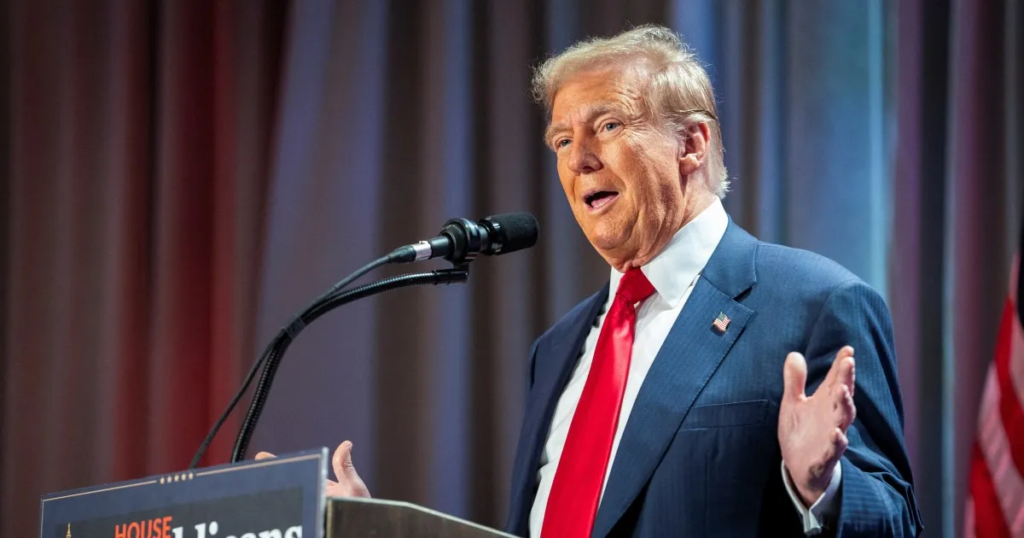Washington D.C., May 1, 2025 — In a move that has shocked the global film industry, former President Donald J. Trump has announced a 100% tariff on all foreign-made movies entering the United States. Trump, who is currently leading the Republican nomination race for the 2024 elections, claimed that this decision is necessary to “protect the American film industry from collapsing.”

During a rally in Las Vegas, Trump addressed a cheering crowd and said,
“Hollywood is dying. American films are being crushed by foreign garbage. We need to bring back the magic of American cinema, and this is how we do it — by putting America first, even in movies.”
A Bold Move to “Save” Hollywood
The new policy, unofficially called the “Hollywood Protection Tariff”, would place a 100% import tax on all films produced outside the United States. This includes international box office hits from countries like South Korea, India, China, France, and the UK, which have seen growing success in American theaters over the past decade.
Trump argued that foreign films are taking screen time, awards, and profits away from American filmmakers. He also accused Hollywood of losing its patriotic values and becoming too “woke and weak” to attract audiences.
“We used to dominate the film world. Now, we get beaten by low-budget foreign flicks with subtitles. Enough is enough,” Trump said.
Why Now?
The former President’s comments come amid growing concern within the U.S. entertainment industry. Box office revenues have dropped, streaming services have cut original content budgets, and many major studios are struggling to attract global attention.

According to a 2024 report by the Motion Picture Association of America (MPAA), American films accounted for just 38% of global box office earnings, down from 56% a decade ago. Meanwhile, South Korean, Indian, and European films have gained popularity in the U.S. through platforms like Netflix, Amazon Prime, and Hulu.
Trump says the new tariffs will “level the playing field” and encourage Americans to watch more domestic content.
Motion Picture Association Report 2024
Industry Reacts: Mixed Feelings
Hollywood executives and stars had mixed reactions to Trump’s announcement. Some believe that such tariffs could actually harm the industry by cutting off international collaborations and audiences.
Kevin Feige, President of Marvel Studios, said,
“This isn’t about nationalism. Film is a global language. Restricting access or adding cost barriers to international films doesn’t help us — it isolates us.”
Meanwhile, some conservative film producers and directors backed the plan. Independent filmmaker Nick Searcy, known for his right-wing views, praised the policy and said,
“It’s about time someone stood up for American artists. Let’s bring storytelling back home.”
Hollywood’s Global Market Trends 2024
Global Backlash
International reaction has been swift and critical. Film boards and ministries from France, India, and South Korea have condemned the proposed tariffs, calling them “cultural censorship” and “a violation of trade principles.”
The Korean Film Council (KOFIC) released a statement saying,
“Such a move would damage years of cultural exchange and mutual respect. Korean cinema has enriched American audiences, not competed with them.”
The European Film Commission warned that this tariff could start a “trade war in the arts”, with other countries potentially taxing American films in return.
Will the Tariff Be Legal?
Critics argue that Trump, not currently holding any office, cannot legally enforce such a tariff. However, his supporters say that if he is re-elected, he will move quickly to pass executive orders targeting foreign entertainment.
Trade experts believe that a 100% tariff may violate World Trade Organization (WTO) rules, potentially leading to legal challenges in international courts.
Elizabeth Warren, Democratic Senator from Massachusetts, called the policy “absurd and unconstitutional,” adding,
“This would make movie tickets more expensive and restrict consumer choice — all in the name of a political stunt.”
World Trade Organization on Tariffs
What It Means for Audiences
If the tariff is enacted, American theaters would be forced to pay double the cost to screen foreign movies, making it less profitable to show them. This would likely reduce the number of international films shown in the U.S. dramatically.
Popular foreign films like “RRR,” “Parasite,” “The Wandering Earth,” and “The Intouchables” might disappear from U.S. cinemas altogether. Streaming platforms might also raise subscription prices or reduce foreign content offerings, fearing financial losses.
Some cultural critics worry that this would also limit Americans’ exposure to diverse perspectives, which is especially important in a globalized world.
A Political Power Play?
Many political analysts view this policy announcement as part of Trump’s 2024 campaign strategy. By painting Hollywood as a victim of globalism and foreign influence, he strengthens his “America First” platform that previously won him support in 2016.
Polls show that Trump’s base remains highly loyal, and issues like immigration, manufacturing, and now media are being used to reignite nationalist sentiment among voters.
Whether or not the tariff ever becomes real law, it has already succeeded in putting Trump back into the media spotlight — a place he thrives.
Summary:
- Motion Picture Association Report 2024
- Hollywood’s Global Market Trends 2024
- Korean Film Council Statement
- World Trade Organization on Tariffs
Also read – Why America and Europe Are No Longer on the Same Page: The Untold Truth






